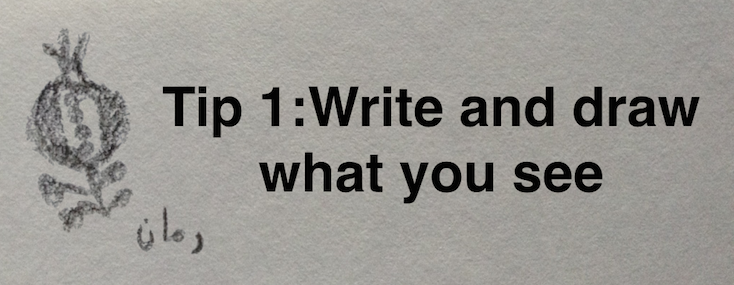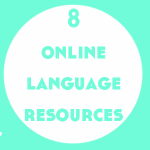February 9th, 2015
Guest Post: 10 Amusing Approaches to Arabic
Today, we have a guest post about Arabic from Meredith Cicerchia. Meredith, in her own words, is an applied linguist who tweets on language @Merelanguage and wrote the Lingua.ly blog of research inspired language learning tips. Modern Standard Arabic and the Moroccan dialect were the fourth and fifth languages she learned after having studied French, Italian and Russian. Her frustration with the lack of resources for MSA and dearth of quality research on TAFL inspired her to do an M.Sc. in Applied Linguistics and Second Language Acquisition at the University of Oxford and she also holds a B.A. in French language and literature from Georgetown University. I shall leave you in her capable hands. Enjoy!
Learning the Arabic script is probably one of the most delightful language projects I’ve ever taken on. Who can think of a more entertaining activity than reading alphabet books, tracing along dotted lines and re-living primary school in the process? Yet once you know your alif, baa’s it’s time to start actually studying the language and this is when most Arabic as a Foreign Language (AFL) students find themselves in trouble.
That’s because there isn’t much in the way of practical guides on where to start. Instead, you are more likely to encounter essays on socio-political motivations for AFL study, dissertations on diglossia and plenty of discouragement from Arabic and English speakers alike who say achieving fluency is nearly impossible.
But don’t worry- it’s not really that bad! In fact, in my experience, Arabic is actually one of those language that gets easier as you move from the basic to beginner level. There are only three tenses, the grammar is relatively uncomplicated and you can invent your own words once you understand the root system. As long as you create a well-rounded language plan and maintain motivation, you’ll make it through the first nine months.
So, here are my Top 10 Tips for Studying the Arabic Language and keeping it fun…
1. Write and draw what you see.
Even if it’s an English word, it will help you get comfortable translating sounds into the new letters. Plus, while you may know the alphabet, productive skills need to be automatized and the more practice you get with your cursive, the better your handwriting will become.
2. Immerse yourself in authentic language.
If you’re not living in an Arabic speaking country, chances are you won’t get much exposure to the script without diacritic marks. Skimming newspaper headlines daily (say an article about George Clooney and his new wife) is a great way to get used to seeing the language in a real context and reading right to left.
3. Say your ع ‘ayn out-loud.
Repeat it over and over again until it makes you laugh. It’s a weird letter that takes some vocal chord training for English speakers to get used to. I have a parrot and I would always leave my Arabic podcasts and lessons on for him when I was out. He mastered the sound (the ق glottal stop too) before I did but that was okay because he helped me figure it out in the process!
4. Use mnemonic strategies.
When you first start studying a language, it is challenging to learn new words because your brain doesn’t always know where to store them. However, once you trick yourself into mastering the first 500, it becomes a piece of cake. Try Memrise’s free program and use a combination of sounds from your native language + imagery to learn new words.
5. Listen to Arabic pop songs.
The first word you will inevitably get to know is “Habibi” or “my love” and then you’ll probably encounter “Albi, albi” the Egyptian ق-less pronunciation of “My heart, my heart.” Check out the lyrics so you don’t try to write it with a ك, which would mean “my dog, my dog.” Arabic Music Translation is the perfect place to start.
6. Read poetry.
Focusing in on the beauty of a language is a wonderful way to get to know it. One of my favorite poems is Khalil Gibran’s “The Pomegranate.” All of the seeds talk to each other about life and learning so you get your philosophy kick at the same time!
7. Get out your cookbooks.
Taste the language and learn how to say the new ingredients as you go. I made hummus, kibbeh and baklava while I was studying Arabic and my friends and family thanked me!
8. Master colloquial phrases.
Arabic speakers love to add oomph to what they say with stock phrases like “Bismillah” and “Alhamdu-lillah.” Often they are of religious origin but their use is so commonplace you’d even say them to your taxi driver. Learn them, use them and love them, as they’ll bring a smile to a native collocutor’s face.
9. Invest in a book with pictures.
They are hard to find but over the past ten years more and more Arabic books containing illustrations, realia and even color have emerged to replace the text filled manuals of yesteryear. Number one in this list is still my favorite.
10. Stay positive!
Do whatever it takes to keep your motivation up, even if that means belly-dancing lessons. Also, the root for dance is رقص or “Raqs” in Arabic which makes for a good keyword e.g. He rocks out on the dance floor to Arabic pop songs. PS. It may seem like a silly method but I did my masters thesis on it and trust me it works!
Learn more Arabic with Talk In Arabic
If you enjoyed this post and you’re learning Arabic, you may well be interested in Talk in Arabic by a team of native speakers and Donovan Nagel of the blog The Mezzofanti Guild. They specialise in bringing you materials with a variety of Arabic dialects. Check it out here!










